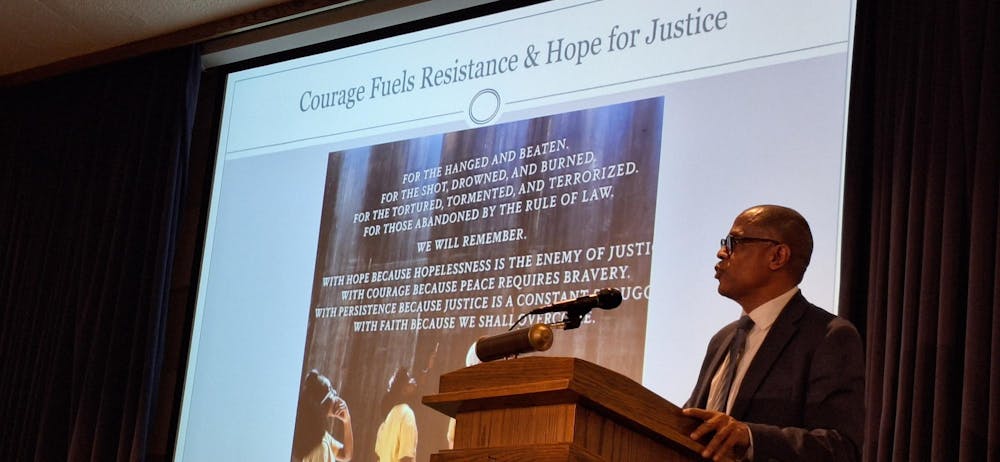On Tuesday evening, the 2024 Thomas Merton Lecture was held at Carroll Auditorium in Madeleva Hall, courtesy of the Center for the Study of Spirituality. The lecture, titled “Courageous Hope in Precarious Times,” was open to the public and live-streamed.
President Katie Conboy introduced the event, speaking to the value the annual lecture has for Saint Mary’s College.
“This lecture always involves prominent speakers who talk about themes related to spirituality and contemporary living in the spirit of Thomas Merton, a leading Catholic figure in the 20th century who emphasized the relationship between contemplation and action in the world,” she said.
Conboy also explained the friendship between the late Sr. Madeleva Wolff and Thomas Merton, sharing that Wolff advocated for Merton’s first writings about contemplative life to be published through Saint Mary’s College.
The keynote speaker was Fr. Bryan Massingale, a Catholic priest of the Archdiocese of Milwaukee and the James and Nancy Buckman professor of theological and social ethics at Fordham University. Massingale is openly gay, and has taught theology classes on sexuality and race.
Massingale began with a discussion of the meaning of the word “precarious” as well as what it meant to be in those times. He specifically wanted the audience to look at “some of the most divisive tensions that affect us and cause worry, concern and fear.”
He raised concerns in light of the recent violence and disrespect occurring to members of the LGBT community, Muslims, Jewish and Black people. He discussed how political divisions have caused a divide in the nation through the existential crisis of the election itself and how different people of political perspectives see each other.
“Those who differ from us are enemies who must be arrested and eliminated, but we cannot envision, much less even desire, a state of common life with those who disagree with us,” Massingale said, characterizing the way in which polarized thinking can manifest.
He also described the state of the nation as “a house divided”, though he believed the term to be too sanitized due to the images he showed previously where the nature of those who disagreed with one another was very clear.
Massingale mentioned that courage and hope are "nurtured in a community’s memories.” He also stated that through their courage, people maintain a strong sense of their own agency, never losing their capacity to love or surrendering their conscience and how they didn’t succumb to the belief that there were no options.
He gave examples of people he found to have courage and hope even with the pain they held. One story included the people who went on a month-long trip to a refugee camp in South Africa and those that are represented in the Freedom Monument Sculpture Park in Montgomery, Alabama.
“I felt anger at the horror,” Massingale said, recalling what he has heard of others’ experiences at the Freedom Monument Sculpture Park, “but then gratitude because they survived. They survived because they loved and nurtured life and hope.”
Editor's Note: A previous version of this story had misspelled Fr. Bryan Massingale's name.










